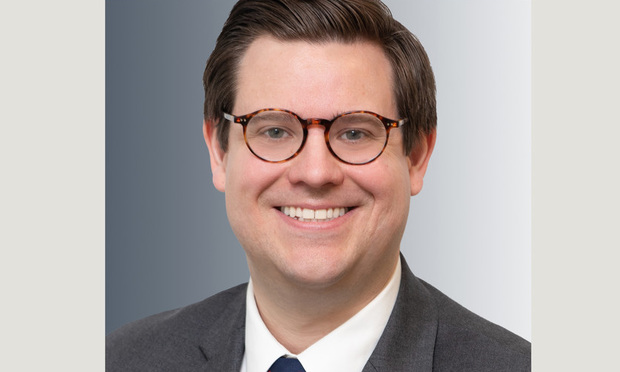Daily Dicta: Paul Weiss Associate Wins Major Sixth Circuit Case in First-Ever Oral Argument
"It was my first argument opportunity," said Will Marks, a former clerk for Sixth Circuit Judge Jeffrey Sutton. "I couldn't give it up."
November 10, 2019 at 08:10 PM
7 minute read
 Paul Weiss associate Will Marks.
Paul Weiss associate Will Marks.
Will Marks was already having a busy fall when he got word from the U.S. Court of Appeals for the Sixth Circuit.
The sixth-year associate at Paul Weiss had been picked off the list of Criminal Justice Act panel members to represent an Ohio prisoner in a meaty case—one that involved a slew of conflicting district court opinions and a possible circuit split. Oh, and oral argument was in about six weeks. Was he interested?
One of five lawyers who followed Kannon Shanmugam when he left Williams & Connolly in early 2019 to build an appellate practice for Paul Weiss, Marks was neck-deep in work on matters including helping Shanmugam with the upcoming Supreme Court argument challenging the structure of the Consumer Financial Protection Bureau. But he'd never delivered an oral appellate argument on his own.
"It was my first argument opportunity," said Marks, a former clerk for Sixth Circuit Judge Jeffrey Sutton. "I couldn't give it up."
Shanmugam was fully supportive. "I said 'Look, we'll make it work," Shanmugam recalled. "It's such a priority to me that associates are able to take advantage of these opportunities. If an associate declines argument opportunities because they're too busy, they'll never do them."
Marks made his debut appearance as an appellate advocate on Oct. 23, and a mere two weeks later, the court on Nov. 7 handed him a win in a published opinion by Judge Amul Thapar.
At eight pages, it's not long—but it's a remarkably interesting read by a judge who was President Donald Trump's first nominee to a federal court of appeals.
Thapar is a former prosecutor and served as the U.S. Attorney for the Eastern District of Kentucky. In this instance, however, he and fellow judges Eric Clay John Nalbandian sided with Marks' client, opening the door to more prisoner lawsuits.
"This was not a simple first argument sort of case," Shanmugam said. "It was a complex case with a really tricky legal issue."
Here's how Thapar tees it up: "Have you ever waited hours in line at the DMV, only to be told once you got to the front that you didn't have the right paperwork? That might be how Dennis Gallivan felt about his lawsuit, which was dismissed because he didn't file a specific affidavit."
An inmate at FCI Elkton in Ohio, Gallivan in 2015 had surgery on his left hand to treat a condition called Dupuytren's contracture which causes the fingers to curl forward.
Gallivan claims that the surgery was not a success and that he received inadequate follow-up care, leaving him with persistent pain and limited use of his hand. In a pro se complaint filed in the Northern District of Ohio, he sued the federal government for negligence under the Federal Tort Claims Act.
But his complaint got nowhere. Ohio has a civil rule—10(D)(2)—that arose out of tort reform legislation.
It requires anyone suing for medical negligence to include an "affidavit of merit" from a medical professional stating that their claim has merit. Gallivan included no such affidavit (and as a prison inmate, it wouldn't exactly be easy to get one). The district court dismissed his case.
 Wait a minute—what about the Federal Rules of Civil Procedure? As Thapar noted, according to Rule 8(a) all you need to file a complaint is a short and plain jurisdictional statement; a short and plain statement of the claim; and an explanation of the relief sought. That's it. There's nothing about any affidavit of merit to get through the courthouse front door. So how can Ohio require it?
Wait a minute—what about the Federal Rules of Civil Procedure? As Thapar noted, according to Rule 8(a) all you need to file a complaint is a short and plain jurisdictional statement; a short and plain statement of the claim; and an explanation of the relief sought. That's it. There's nothing about any affidavit of merit to get through the courthouse front door. So how can Ohio require it?
U.S. District Judge Benita Pearson sidestepped the issue by concluding that Rule 10(D)(2) is not procedural. She reasoned that it's substantive Ohio law because it determines the outcome of the case—i.e. no affidavit = you lose. "[T]herefore, the obligations it creates are binding on plaintiff," she held.
This question—is the affidavit requirement substantive or procedural—has proven persistently difficult to answer. In an amicus brief filed by a similarly situated litigant, Raymond Vasvari Jr. of Vasvari & Zimmerman and Joel Levin of Levin & Associates counted 16 cases in the Northern District of Ohio alone that addressed the question. In 11 instances, judges came down on the substantive side, versus five in favor of procedural.
Nor is it just an Ohio issue. About two dozen other states have similar affidavit rules, and the Seventh Circuit in another prisoner med mal case, Kahn v. Walsh, also landed in the substantive camp.
But not Thapar. With devastating simplicity, he explained why all the other judges have gotten wrong.
"The first question we must ask is whether the Federal Rules of Civil Procedure answer the question in dispute: does someone need an affidavit of merit to state a claim for medical negligence?" he wrote. "In other words, do the Federal Rules answer 'the same question' as the state rule? If the Federal Rules answer that question, we then must ask whether the Federal Rules are valid under the Constitution and the Rules Enabling Act."
Both answers are yes, the Sixth Circuit panel held in reversing and remanding the case—a resounding win for Marks.
"For the first question, the Federal Rules provide a clear answer: no affidavit is required to state a claim for medical negligence," Thapar wrote. "Rule 8 does not require litigants to file any affidavits. Nor does Rule 12."
Rule 9 specifies a few instances where there are heightened pleading requirements, such as when a party alleges fraud or a mistake. But those don't apply here.
As for the second question, yes of course the Federal Rules of Civil Procedure are valid (nor did anyone attempt to suggest otherwise).
Moreover, Thapar pointed out that the Federal Tort Claims Act as originally enacted "expressly said that courts should apply the Federal Rules," he wrote. "Second, a Federal Rule (if valid) displaces inconsistent state law … All that matters is that there is a conflict (check) and a valid Federal Rule (check again)."
"Besides," he added, "it doesn't make sense for federal courts to have one system of procedural rules in diversity cases and another in FTCA cases—at least absent clear instructions to the contrary. And we have no such instructions here."
So what about the substantive versus procedural question?
Thapar points to a 2008 decision by the Ohio Supreme Court. Echoing what Marks wrote in his brief, Thapar noted that Ohio's highest court read the "explicit text" of Ohio Rule 10(D)(2) as placing "a heightened pleading requirement" on parties bringing medical-negligence claims. "If a complaint lacks the 'required' affidavit, the court has said, it suffers from a 'pleading deficiency' and may be dismissed."
That makes it procedural, not substantive. "Ohio Rule 10(D)(2) creates a heightened pleading requirement. Nothing more," Thapar wrote.
As Marks observed, "One mark of great opinion writing is it that it makes it seem like there's only one answer," he said. "Even with the knotty legal issue, there was a simple answer: federal rules govern federal procedural issues."
This content has been archived. It is available through our partners, LexisNexis® and Bloomberg Law.
To view this content, please continue to their sites.
Not a Lexis Subscriber?
Subscribe Now
Not a Bloomberg Law Subscriber?
Subscribe Now
NOT FOR REPRINT
© 2025 ALM Global, LLC, All Rights Reserved. Request academic re-use from www.copyright.com. All other uses, submit a request to [email protected]. For more information visit Asset & Logo Licensing.
You Might Like
View All
Firms Come Out of the Gate With High-Profile Litigation Hires in 2025

2024 Marked Growth On Top of Growth for Law Firm Litigation Practices. Is a Cooldown in the Offing for 2025?

Big Company Insiders See Technology-Related Disputes Teed Up for 2025

Litigation Leaders: Jason Leckerman of Ballard Spahr on Growing the Department by a Third Via Merger with Lane Powell
Trending Stories
- 1With AI, What Changes Can Midsize Firms Expect?
- 2Saul Ewing Loses Two Partners to Fox Rothschild, Marking Four Fla. Partner Exits in Last 13 Months
- 3Eagles or Chiefs? At These Law Firms, Super Bowl Sunday Gets Complicated
- 4Former NY City Hall Official Tied to Adams Corruption Probe to Plead Guilty
- 5Wilmer, White & Case, Crowell Among the Latest to Add DC Lateral Partners
Who Got The Work
J. Brugh Lower of Gibbons has entered an appearance for industrial equipment supplier Devco Corporation in a pending trademark infringement lawsuit. The suit, accusing the defendant of selling knock-off Graco products, was filed Dec. 18 in New Jersey District Court by Rivkin Radler on behalf of Graco Inc. and Graco Minnesota. The case, assigned to U.S. District Judge Zahid N. Quraishi, is 3:24-cv-11294, Graco Inc. et al v. Devco Corporation.
Who Got The Work
Rebecca Maller-Stein and Kent A. Yalowitz of Arnold & Porter Kaye Scholer have entered their appearances for Hanaco Venture Capital and its executives, Lior Prosor and David Frankel, in a pending securities lawsuit. The action, filed on Dec. 24 in New York Southern District Court by Zell, Aron & Co. on behalf of Goldeneye Advisors, accuses the defendants of negligently and fraudulently managing the plaintiff's $1 million investment. The case, assigned to U.S. District Judge Vernon S. Broderick, is 1:24-cv-09918, Goldeneye Advisors, LLC v. Hanaco Venture Capital, Ltd. et al.
Who Got The Work
Attorneys from A&O Shearman has stepped in as defense counsel for Toronto-Dominion Bank and other defendants in a pending securities class action. The suit, filed Dec. 11 in New York Southern District Court by Bleichmar Fonti & Auld, accuses the defendants of concealing the bank's 'pervasive' deficiencies in regards to its compliance with the Bank Secrecy Act and the quality of its anti-money laundering controls. The case, assigned to U.S. District Judge Arun Subramanian, is 1:24-cv-09445, Gonzalez v. The Toronto-Dominion Bank et al.
Who Got The Work
Crown Castle International, a Pennsylvania company providing shared communications infrastructure, has turned to Luke D. Wolf of Gordon Rees Scully Mansukhani to fend off a pending breach-of-contract lawsuit. The court action, filed Nov. 25 in Michigan Eastern District Court by Hooper Hathaway PC on behalf of The Town Residences LLC, accuses Crown Castle of failing to transfer approximately $30,000 in utility payments from T-Mobile in breach of a roof-top lease and assignment agreement. The case, assigned to U.S. District Judge Susan K. Declercq, is 2:24-cv-13131, The Town Residences LLC v. T-Mobile US, Inc. et al.
Who Got The Work
Wilfred P. Coronato and Daniel M. Schwartz of McCarter & English have stepped in as defense counsel to Electrolux Home Products Inc. in a pending product liability lawsuit. The court action, filed Nov. 26 in New York Eastern District Court by Poulos Lopiccolo PC and Nagel Rice LLP on behalf of David Stern, alleges that the defendant's refrigerators’ drawers and shelving repeatedly break and fall apart within months after purchase. The case, assigned to U.S. District Judge Joan M. Azrack, is 2:24-cv-08204, Stern v. Electrolux Home Products, Inc.
Featured Firms
Law Offices of Gary Martin Hays & Associates, P.C.
(470) 294-1674
Law Offices of Mark E. Salomone
(857) 444-6468
Smith & Hassler
(713) 739-1250






